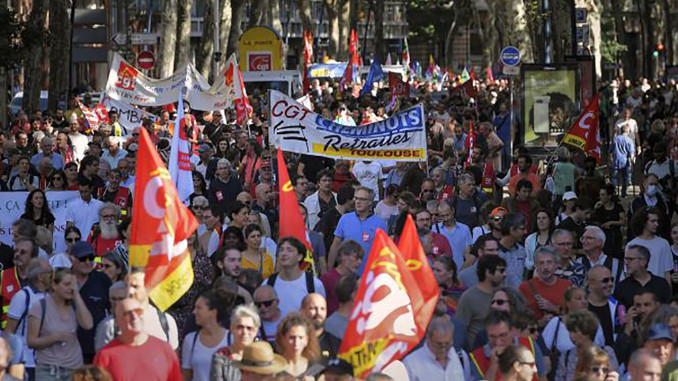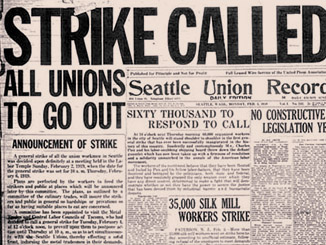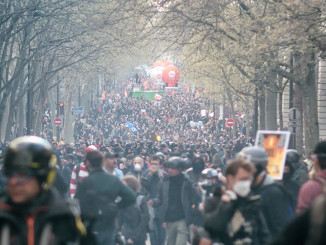
October 24, 2022 Editorial of the Workplace Newsletters of the Etincelle fraction of the NPA, Translated from French.
President Macron did not see this one coming: the oil workers’ strike sparked a protest that had been brewing for months. And even if the movement is on hold in several refineries, their struggle was not for nothing. On the contrary, it is a serious warning to Macron and the bosses: it is the beginning of a united movement to impose a general wage increase. The day of strikes and demonstrations of October 18 is only the beginning.
The beginning of an overall struggle?
For months, isolated strikes have been breaking out to force employers to raise wages in the face of inflation. The oil workers’ strike has turned into an arm-wrestling match between Macron and the employers on the one hand, and the strikers and the employees who supported them on the other, despite government propaganda and the gas shortage.
Prime Minister Elizabeth Borne’s order to the oil workers to go back to work provoked a spontaneous reaction of anger, solidarity… and the desire to get down to business to settle accounts with arrogant ministers and bosses, who have been gorging themselves with profits for years. Everywhere it’s the same thing, ridiculous negotiations and bogus bonuses: enough now! Wages must be increased! Carlos Tavares, CEO of the auto company Stellantis, claims to be an employee like any other with his 19-million-euro salary per year. Patrick Pouyanné, CEO of TotalEnergies, got a salary increase of 52% in one year. It’s our turn to get what we need to make ends meet!
Preparing for what comes next
The refinery strike may be over, but the battle is far from done with. Strikes over wages are continuing in several companies. So much so that it has become a political problem for the government, which is pushing the bosses to negotiate a few small adjustments or bonuses workplace by workplace, in order to diffuse the protest.
On the other hand, on our side, to prepare the next steps of the movement, we have to organize ourselves at the grassroots and express our common demands to the whole world of working people: for example, the demands to ensure a 400-euro salary increase for all taken from the capitalist profits with no salary lower than 2,000 euros net, and to index all incomes to inflation, meaning that incomes rise at the rate of inflation.
Our motion of censure: a general strike
Because this movement has political importance, the left-wing parties are trying to channel the social anger into parliamentary debates. But this is a dead end for us because in parliament the government can turn our protest into hot air. For example, thanks to Article 49.3 of the French constitution, President Macron and Prime Minister Borne were able to pass the 2023 budget, which was stuffed with tax exemptions for corporations without even a vote. Not a care was given to the thousands of amendments proposed by the left wing, or the hours of discussion in the National Assembly. With 49.3, the Executive can bypass the National Assembly. As a result, now the left-wing in the Assembly is reduced to wondering whether or not to vote for a motion of censure along with the deputies of the National Rally (right-wing populist party) who were in favor of ordering the striking workers back to work, and who want to tighten the rules on unemployment benefits. This is not what will make the government back down. Our real strength as workers is the strike!
The struggle belongs to those who lead it
What we need to prepare is a strike that extends to several companies in order to make the employers really feel our power. We need a coordinated movement led by the grassroots, not by union leadership. The unions can call for mobilizations, but also slow them down, or even stop them, like the French Democratic Confederation of Labor (The CFDT, one of the five major French confederations of trade unions) which negotiated the resumption of work in the refineries behind the strikers’ backs. Even when they seem to be more combative, the union leaderships make their own calculations. It is up to the workers to decide on our demands, and to control our strikes.
Multi-professional strike days are already planned for October 27 and November 10. These are opportunities that must be seized to continue mobilizing. But in order to beat back the employers and the government one day of action isn’t enough. We need to have a united struggle that is determined to go all the way.




